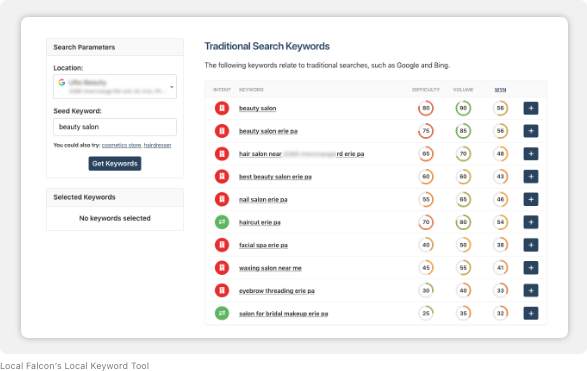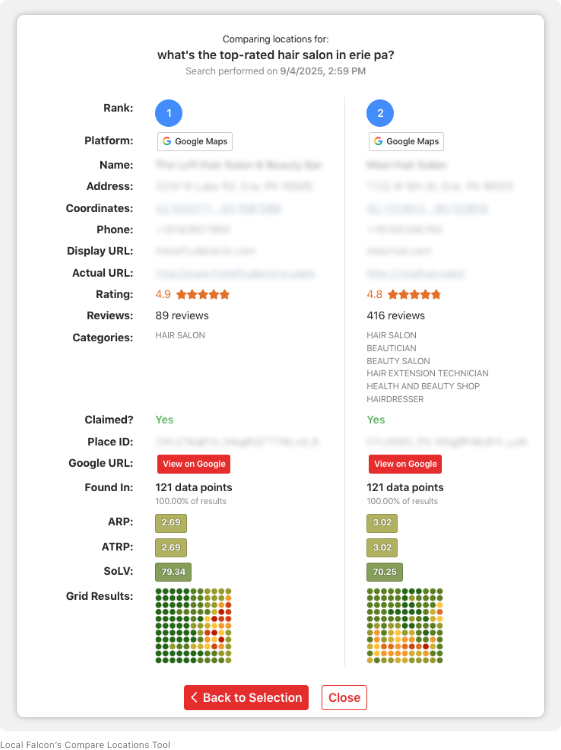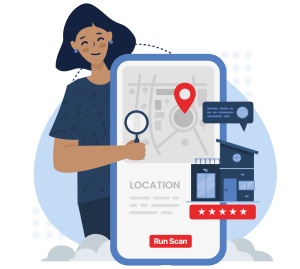The demand for local SEO services has never been higher. Businesses of all sizes now understand that ranking well in local search results for their city or neighborhood is just as important as having a website in the first place. If you're exploring how to start a local SEO business, you're stepping into a field with plenty of opportunity, but also plenty of competition.
The key to standing out when starting a local SEO agency or company is simple: equip yourself with the right mix of tools and services. The right stack not only helps you deliver measurable results but also builds trust with clients who expect transparency and data-driven strategies.
Below, you'll find 10 of the most essential tools and services to include when starting your local SEO business.
10 Essential Tools and Services for Starting a Local SEO Business
1. Geo-Grid Rank Tracking
One of the first challenges new agencies face is proving results to clients. Traditional rank tracking tools usually show a single average ranking for a keyword, but local search is far more complex. Where a business shows up on Google Maps can vary street by street.
That's where geo-grid rank tracking comes in. A geo-grid scan generates a visual grid of rankings across an entire service area, revealing exactly where your client is visible and where they are not. For example, a dentist in Chicago might rank in the top three Google map pack spots right around their office, but drop out completely just two miles away. Without geo-grid rank tracking, you would never see that gap or have the chance to fix it.
Agencies that use geo-grid visuals have a competitive advantage over those that don't. They can identify coverage blind spots, set location-based benchmarks, and present clients with visuals that make SEO performance easy to understand.
![]()
2. Google Business Profile Optimization
Google Business Profile (GBP) optimization is at the core of every local SEO strategy. GBP still drives the majority of website visits, calls, and direction requests for local businesses, and those businesses that don't have a strong Google Business Profile presence get left in the dust by competitors who do.
When starting a local SEO agency, you'll want to become fluent in:
- Selecting the right GBP business categories and attributes
- Adding services, products, and menu items with keyword-rich descriptions
- Uploading high-quality photos and videos that improve click-throughs
- Publishing posts to promote specials, events, or seasonal offers
- Collecting and responding to customer reviews regularly
- Monitoring for unwanted "suggested edits"
Properly optimized GBP listings not only boost visibility but also influence customer decision-making. A complete, active profile makes businesses look more trustworthy and engaged compared to competitors, thus helping them attract more nearby customers.
3. AI Search Visibility Insights
Search is changing rapidly. Google's AI Overviews, Gemini, ChatGPT, and other AI-powered platforms are already influencing how people discover local businesses. For example, on Google, users are now frequently being shown AI-generated summaries that highlight a handful of local businesses above the traditional Google Maps results and organic list of blue website links.
If you're starting a local SEO business today, you can't afford to ignore AI search. Tracking AI visibility is becoming as important as monitoring Google Business Profile rankings. Clients will increasingly ask things like: Am I showing up in AI Overviews and ChatGPT responses? If you can't answer that, you risk falling behind competitors who can.
Agencies that measure and report on AI search visibility will position themselves as forward-thinking partners who protect their clients from being left out of the next big shift in search.
4. Review Analysis & Reputation Management
Reviews play a dual role in local SEO. First, they influence rankings because Google rewards businesses with frequent positive reviews. Second, they drive conversions since most customers won't call a business with a three-star rating when they see five-star competitors nearby.
As an agency, you'll need tools to:
- Monitor new reviews across Google, Yelp, Tripadvisor, Facebook, and industry-specific platforms
- Analyze review sentiment and spot trends (for example, repeated complaints about service delays)
- Send automated review requests to happy customers
- Flag and respond quickly to negative feedback
Reputation management is not just about damage control, it's also a proactive way to showcase client excellence and build community trust.
5. Local Keyword Research
Starting a local SEO company requires going beyond generic keyword research, but most SEO keyword tools are built for national or global search strategies, meaning they don't surface lower-volume local keywords.
To win locally, you need a local keyword research tool that helps you uncover hyperlocally relevant terms, such as:
- Neighborhood-level queries like "plumber in Brooklyn Heights"
- Landmark-based searches such as "restaurants near the CN Tower"
- "Near me" keywords that signal immediate purchase intent
- Long-tail service plus city combos like "affordable wedding photographer in Austin"
Targeting the phrases real local customers use helps you generate traffic that converts and show clients you understand their market better than cookie-cutter agencies.

6. Local Content Marketing
Once you know which keywords matter, you'll need a content strategy that brings them to life through informational blog posts and other proven formats, such as:
- Service area landing pages: Individual pages for each city or neighborhood a business serves
- Event coverage: Blog posts tied to local fairs, festivals, or community events
- FAQ pages: Content answering common customer questions tied to local intent
- Customer showcases: Highlighting local clients, projects, or case studies
Local content not only supports rankings but also makes businesses feel relevant and connected to their community. Agencies that can produce this type of content consistently will build authority faster.
7. Competitive Analysis & Reporting
Your clients don't just want to know how they are doing, they want to know how they compare to competitors. Effective local SEO reporting should include:
- Rank comparisons across multiple businesses on the same geo-grid
- Google Business Profile audits that show competitor strategies
- AI visibility gap analysis between clients and their rivals
- Reputation comparisons covering key metrics like review count and average rating as well as in-depth sentiment analysis
This type of competitive intelligence turns raw SEO data into actionable insights clients can understand and act on. Ultimately, this helps make your agency indispensable, especially for businesses in crowded, ultra-competitive markets.

8. Citation & Directory Management
Citations, or online mentions of a business, are one of the oldest and still one of the most reliable signals of local relevance. But inconsistent or incorrect citations can drag down rankings, confuse customers, and cost businesses revenue.
Agencies should build processes for:
- Submitting clients to top directories like Yelp, Tripadvisor, and niche-specific sites
- Correcting outdated or inconsistent information
- Removing duplicate listings that split ranking power
- Monitoring for changes over time
While it may not be the flashiest part of local SEO, citation management is one of the best ways to build authority and trust for businesses working to increase their local visibility.
9. On-Page Local SEO Essentials
Off-page tactics only go so far if a client's website is not optimized for local signals. Every site you manage should include:
- Local business schema markup to help search engines understand details like address and hours
- Keyword-optimized meta titles and descriptions with city or neighborhood terms
- Mobile-friendly design that loads fast and encourages calls or directions
- Clear internal linking to connect service pages with relevant location pages
Strong on-page SEO gives Google the confidence to rank your client higher in both organic and map results.
10. Analytics & Performance Tracking
Finally, no local SEO agency can survive without robust reporting. Clients expect clarity on what's working, what isn't, and where they are improving over time.
At a minimum, most SEO businesses use Google Analytics and Search Console. But local SEO requires more specialized reporting:
- Geo-grid scan reports and trend reports to visualize rankings across service areas
- AI visibility reports to show emerging opportunities
- Review and sentiment analysis dashboards
- Competitor comparison charts
Clear, visual reporting keeps clients engaged and helps justify ongoing retainers, which is essential for agency growth.
Bonus Services Worth Offering Clients
Once your core local SEO services are running smoothly, you can consider expanding into adjacent areas that boost revenue and client satisfaction:
- Social media management: Build community presence through Facebook Groups, Instagram Reels, or TikTok
- Paid search campaigns: Manage Google Ads or Local Services Ads as a complement to SEO
- Industry-specific optimization: Offer specialized packages for industries like legal, restaurants, or healthcare that require unique strategies
Adding these services not only increases your agency's value but also helps you stand out against competitors offering one-size-fits-all SEO.
FAQs About Starting a Local SEO Business
How do I start a local SEO business from scratch?
Begin by building your skills in local SEO fundamentals, especially Google Business Profile optimization, keyword research, and local content. Then, choose a niche, set up your business legally, create a professional website, and start building a portfolio, often through free or discounted projects at first.
What tools do I need when starting a local SEO agency?
At a minimum: geo-grid rank tracking, citation management tools, AI visibility reporting, review monitoring, keyword research platforms, and analytics dashboards. These tools make your services measurable and scalable.
How much can I charge clients as a local SEO company?
Pricing varies by market and the number of locations a client needs local SEO for. Agencies with strong reporting and proven results, especially for multi-location businesses, can command higher retainers.
Is starting a local SEO agency profitable?
Yes, local SEO is one of the fastest-growing areas of digital marketing. With more brick-and-mortar and service-area businesses shifting budgets online, agencies that provide transparent results and client-focused reporting often see strong recurring revenue.
How long does it take to see results with local SEO?
Results vary by competition and starting point. Some businesses may see improvements within a few weeks after GBP optimization, while others take several months to gain traction in a highly competitive area. Consistency is key.
Final Thoughts
Starting a local SEO business today is about more than just knowing how to optimize a website. Building your agency around the right tools and services allows you to deliver measurable, location-specific results that clients can see and trust.
If you're serious about starting a local SEO agency that clients trust and stay with, build your foundation on tools like Local Falcon that reveal real-world visibility, simplify reporting, and make the path to local success clear. That's how you'll scale from a new agency to a trusted local SEO leader!


